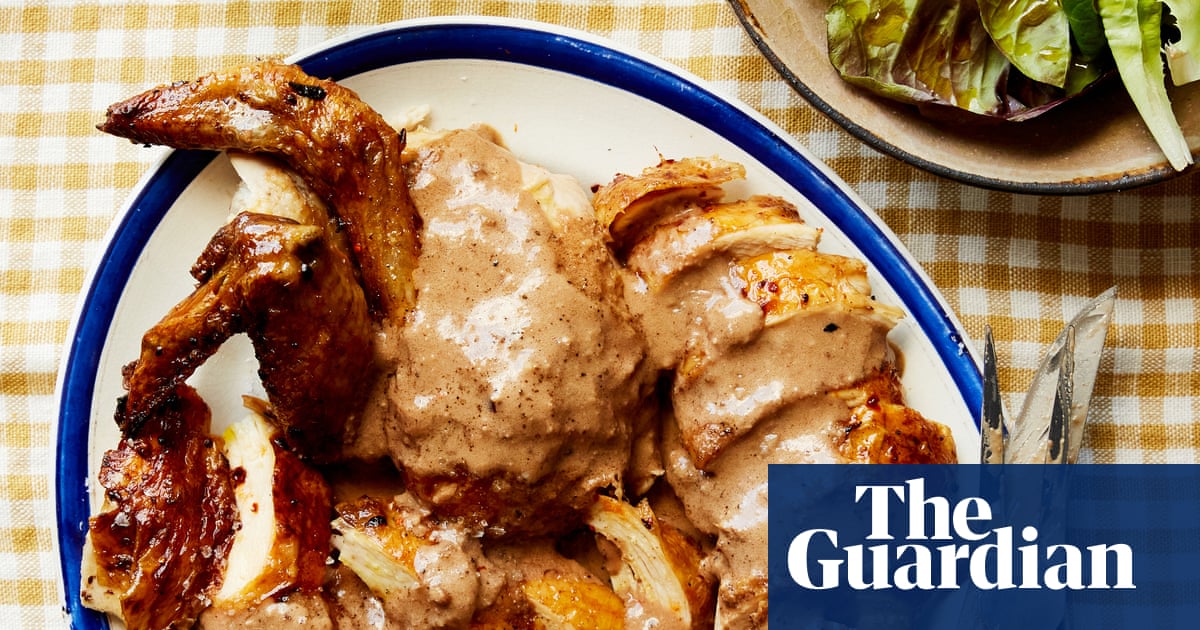The South Caucasus is a region that has taught me just how much can be done with herbs and nuts. Intensely fresh and fragrant, herbs are used liberally in Armenia, Azerbaijan and Georgia, and never as an afterthought or as mere garnish. In fact, entire bunches of basil, coriander and tarragon will often accompany grilled and roast meat from springtime right through to autumn, while bulgur salad is always more leaf than wheat; sorbet may be basil and soda is often tarragon, too. Walnuts are another mainstay of kitchens throughout the region, where they go into salads and cakes and, perhaps best of all, are ground into thick, rich sauces.
At a restaurant in Dilijan, northern Armenia, we ate roast chicken that, given its wine and walnut sauce, had a distinctly Georgian flavour. I suggest keeping things simple and serving this with just a green salad, a plate of sliced tomatoes or a cucumber and herb salad.
Prep5 minCook1 hr 30 minServes4
1 whole free-range chicken without giblets(about 1½kg)Juice of ½ lemon, shell reserved1 tbsp olive oil1½ tsp sea salt flakesBlack pepper½ tsp sweet paprika½ tsp red pepper flakes
For the sauce60gwalnuts1 large garlic clove, peeled and roughly chopped½ tsp ground coriander¼ tsp ground blue fenugreek½ tsp ground cuminJuice of ½ lemon100mhot chicken stock2 tbsp white wine
Heat the oven to 200C(180C fan)/400F/gas 6. Cut away and discard any fat from around the cavity of the chicken. Pour over the lemon juice, drizzle with the oil and season the bird inside and out. Sprinkle over the spices, then put the squeezed-out lemon half into the cavity.
Lay the chicken breast side down in a roasting tin, then roast for an hour, until the juices run clear when you pierce the thickest part of the thigh and there is no pinkness to the meat. Cover, then put in a warm place to rest while you make the sauce.
Toast the walnuts in a small, dry frying pan, then put them in a food processor and add all the remaining sauce ingredients bar the stock and wine. Blitz to a wet sand texture, then scrape into a saucepan and add the hot stock and any juices from the resting chicken. Simmer, stirring often, for 10 minutes, until thickened, then add the wine and cook again for a couple of minutes, until you have a hummus-like sauce. Take off the heat, leave to cool to room temperature, then check the seasoning.
Serve the chicken hot or cold with the walnut sauce alongside.
Inspired by the vibrancy of theAslamazyan sisters’ work, this colourful salad demonstrates how Armenians often pair sweet with savoury and sharpness. Make this for meze-style lunch gatherings, or serve as a side to grilled meat and fish.
Prep5 minCook20 minServes4, as a side
70gwalnut halves1 small orange1 small, firm green apple2 celery sticks, chopped small and leaves reserved1 tbsp extra-virgin olive oil1 tbsp lemon juiceSea salt andblack pepper
Begin by toasting the nuts to bring out their flavour fully. Heat the oven to 180C (160C fan)/350F/gas 4, then bake the walnut halves for about eight minutes – keep a close eye on them, and take them out of the oven once they smell roasted. Leave to cool, then break up the walnut halves into slightly smaller pieces.
Peel the orange, then carefully pare off the white pith. Slice the orange in half, then pull out any seeds and cut the fruit into crescents. Core the apple (there’s no need to peel it) and cut it into thin half-moons.
In a large bowl, combine all the salad ingredients with the olive oil and lemon juice, season well, toss and serve.
These recipes are edited extracts from Green Mountains, by Caroline Eden, published by Quadrille at £28. To order a copy for £25.20, visitguardianbookshop.com
